Learn about the debate over Ramses the Great's role in the Exodus story—where history, religion, and mystery converge.
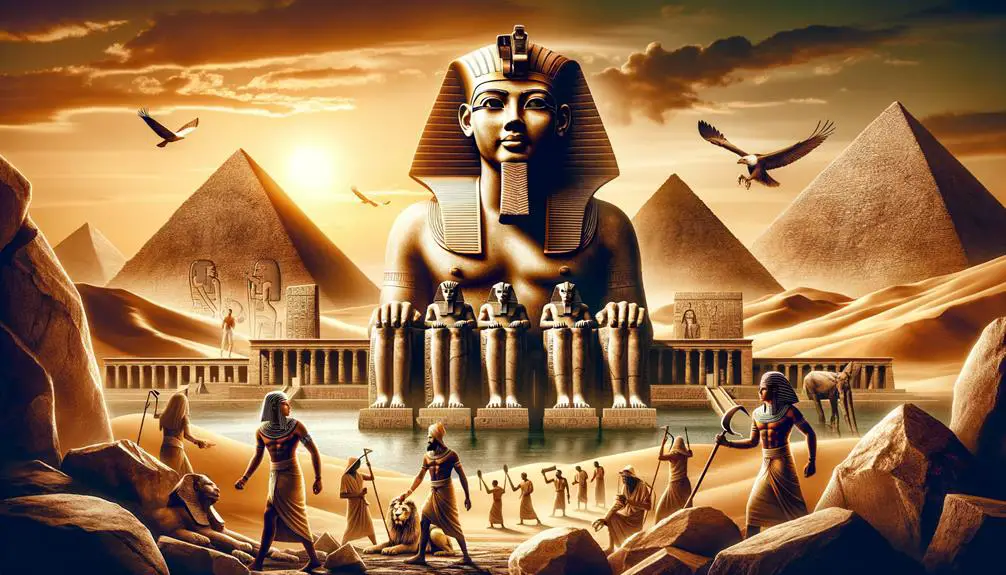
Who Is Ramses in the Bible
You've likely heard theories that Ramses the Great is the pharaoh of the Exodus story in the Bible, but how much truth is there to this claim? As a figure shrouded in both historical grandeur and biblical narrative, Ramses' potential role sparks endless debates among scholars, theologians, and history buffs alike.
His legacy, immortalized in stone and scripture, poses intriguing questions about the intersections of faith, history, and archaeology. By examining the evidence and arguments surrounding his identity, you're invited into a discussion that not only explores ancient civilizations but also challenges our understanding of historical and religious texts.
Why does Ramses' identification matter, and what could it reveal about our past?
Key Takeaways
- Ramses, particularly Ramses the Great, is often linked with the Exodus story as the Pharaoh opposing the Israelites' liberation.
- His era's monumental constructions and administrative details align with descriptions in biblical narratives, supporting his identification in the story.
- The debate around Ramses' role in the Bible highlights the complexities of matching biblical accounts with historical and archaeological evidence.
- Ramses' legacy, through structures like Abu Simbel and the Ramesseum, provides a backdrop to understand the cultural and political context of the Exodus.
Historical Background of Ramses
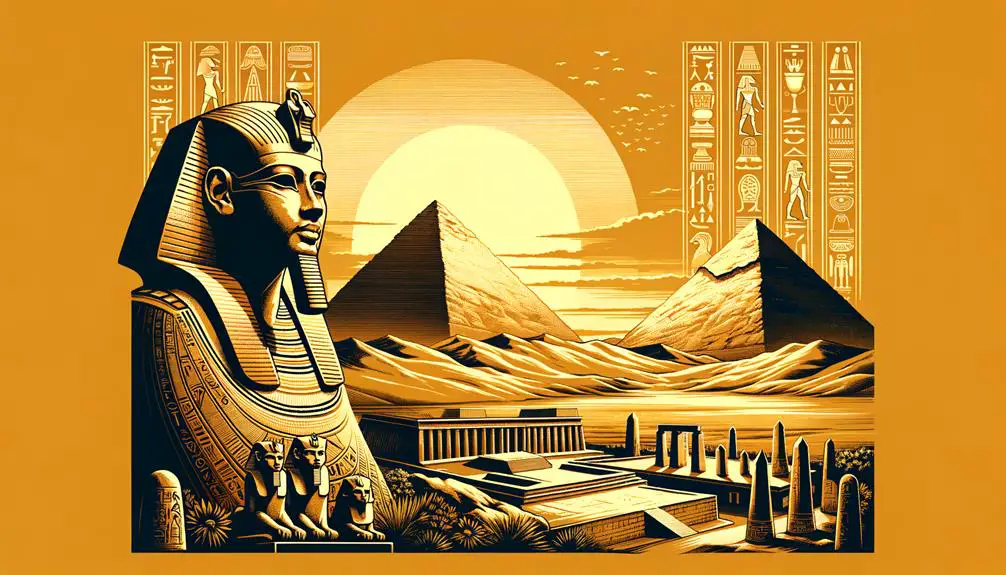
Ramses, a name echoing through the corridors of history, refers to several pharaohs of ancient Egypt, most notably Ramses the Great, who's often associated with the biblical Exodus, though historical and archaeological evidence of this connection remains debated among scholars. Ramses the Great's reign, a cornerstone of the New Kingdom era, spanned from 1279-1213 BCE, marking a period of unprecedented construction, military expansions, and cultural achievements.
You'll find that understanding Ramses' reign timeline is crucial to appreciate the complexities of his era, including the monumental construction projects like the temples at Abu Simbel and the Ramesseum. These endeavors not only showcased the architectural ingenuity of the time but also served as political tools, reinforcing the divine status of the pharaoh and the stability of his reign amid the challenging dynastic politics of ancient Egypt.
Dynastic politics, an intricate web of alliances, and rivalries shaped the landscape of Ramses' rule. His ascension to the throne wasn't merely a testament to his lineage but also to his ability to navigate the perilous waters of court intrigue and familial competition. The succession of power, often fraught with challenges, was a delicate dance of diplomacy and strategic marriages, which Ramses managed with a degree of acumen that further solidified his legacy.
Analyzing Ramses' reign timeline and the role of dynastic politics offers a window into the governance and societal structures of ancient Egypt. It provides a nuanced understanding of Ramses' era, beyond the monumental relics, as a time of political sophistication, strategic governance, and cultural prosperity.
Ramses in Biblical Narratives
In biblical narratives, the figure of Ramses is often intertwined with the story of the Exodus, presenting a complex intersection of history and faith. This portrayal of Ramses as Pharaoh during this period brings forth intriguing discussions on Biblical accuracy and historical evidence. Scholars and theologians alike delve into the nuances of his depiction, seeking to understand the layers of meaning behind this character's role in the scriptures.
Pharaoh's portrayal in these narratives isn't just a mere historical reference but a symbolic representation of the quintessential antagonist in the liberation story of the Israelites. This character's depiction serves multiple purposes, ranging from illustrating the tyrannical rule that the Israelites endured to highlighting the divine intervention that led to their freedom. The mention of Ramses by name has led to extensive research and debate regarding the accuracy of this identification and its correlation with the known historical timeline of Ramses' reign in Egypt.
The quest for Biblical accuracy has prompted scholars to examine archaeological evidence, historical records, and scriptural texts to piece together a coherent picture of this era. Despite the challenges in aligning biblical narratives with historical timelines conclusively, the figure of Ramses stands as a pivotal element in understanding the Exodus story's context and significance. It underscores the complexities of reconciling faith-based narratives with historical facts, inviting readers to explore the depths of these ancient texts with a critical and open mind.
The Exodus Story Explained
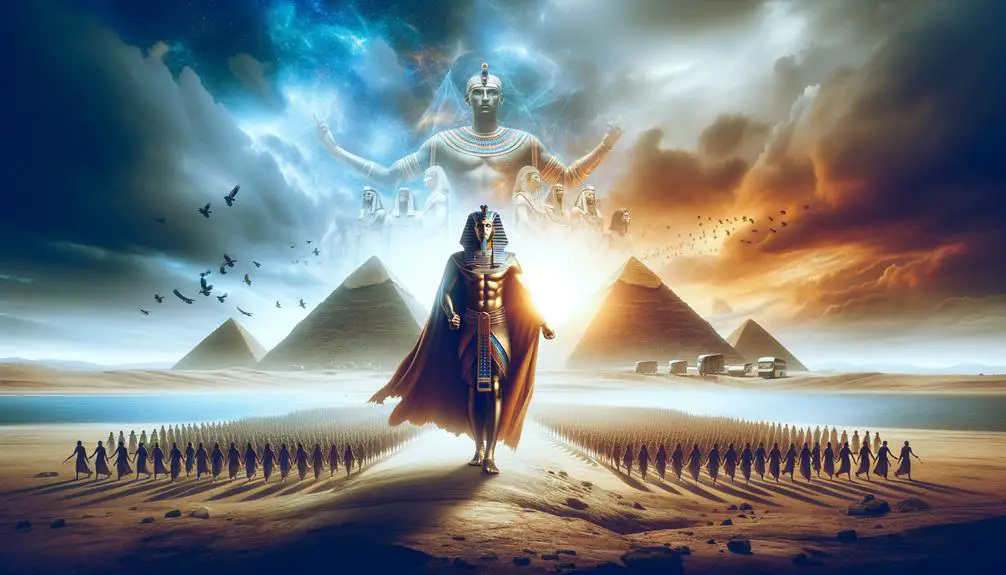
At the heart of the Exodus story, you'll find a narrative deeply embedded within the cultural and religious identity of the Jewish people, detailing their liberation from slavery in Egypt. This saga, under Moses' leadership, unfolds with a series of events that not only signify a physical journey but also encapsulate profound theological and moral lessons. Moses, once a prince of Egypt, becomes the liberator of the Hebrews, showcasing his resilience and unwavering faith in the divine.
Central to this narrative is the significance of the plagues, ten calamities inflicted upon Egypt. These plagues serve multiple purposes within the story. Firstly, they act as divine retribution against Pharaoh's stubbornness and the Egyptians' oppression of the Hebrews. Each plague escalates in intensity, reflecting the increasing urgency for Pharaoh to release the Hebrews from bondage. Secondly, the plagues underscore the power and sovereignty of the Hebrew God over the pantheon of Egyptian deities, each plague targeting the domain of a specific Egyptian god.
Moreover, Moses' leadership during this tumultuous period is pivotal. His ability to negotiate with Pharaoh, coupled with his role as the intermediary between God and the Hebrew people, cements his legacy as a foundational figure in Jewish history. Through his guidance, the Hebrews navigate their emancipation, marking the birth of a nation under a covenant with God.
In analyzing the Exodus story, it's clear that the themes of liberation, faith, and divine justice are intricately woven through the narrative, with Moses' leadership and the significance of the plagues providing crucial layers of understanding to this epochal event.
Archaeological Evidence Linking Ramses
While exploring the Exodus narrative, it's essential to consider the archaeological findings that connect the story to Ramses the Great, shedding light on the historical context of this biblical event. The connections between Ramses II, one of Egypt's most formidable pharaohs, and the biblical Exodus are intriguing, primarily due to archaeological discoveries that align with descriptions of Ramses' reign.
- Ramses' Construction Projects: Extensive archaeological evidence points to Ramses II's ambitious construction projects throughout Egypt, including in the cities of Pi-Ramesses and Thebes. These sites, rich with temples and monuments adorned with inscriptions, match the biblical descriptions of the cities built by the Israelites during their enslavement. The discovery of storage cities, which could correlate with the biblical Pithom and Raamses, further strengthens this link.
- Military Campaigns: Inscriptions and reliefs depicting Ramses' military campaigns, particularly those in Canaan, provide a backdrop that aligns with the geopolitical landscape described in the Exodus narrative. His campaigns into territories mentioned in the biblical account help contextualize the period of the Israelites' exit from Egypt.
- Settlement Patterns: Archaeological digs have uncovered shifts in settlement patterns during Ramses' reign that correspond with the timeline suggested for the Exodus. These findings include evidence of new settlements in the region where the Israelites are said to have wandered.
- Documentary References: There are papyri and inscriptions from Ramses' time that, while not directly mentioning the Israelites, detail administrative and logistical aspects of his reign that align with the logistical feats described in the Exodus story, such as the management of large populations and resources.
This archaeological evidence, while not conclusively proving the biblical narrative, provides a fascinating context that connects Ramses the Great to one of the Bible's most enduring stories.
Debates Around Ramses' Identity
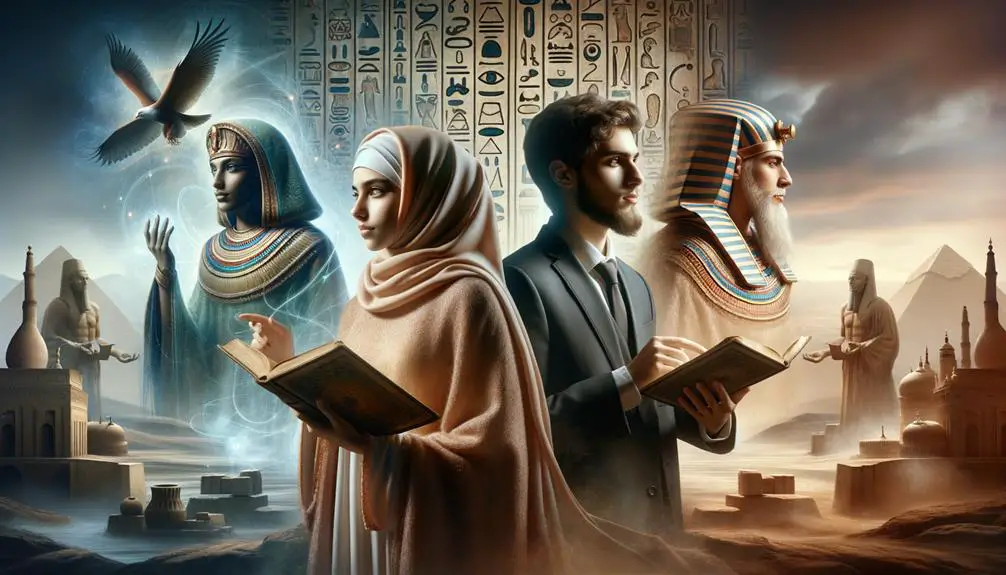
Scholars often debate Ramses' precise identity within the biblical narrative, focusing on discrepancies and alignments between historical records and scriptural accounts. This debate centers on Ramses' portrayal as a pharaoh, specifically in the context of the Exodus story, and the chronological discrepancies that arise when comparing biblical timelines with Egyptian historical records.
To understand this debate better, let's examine a table that highlights key points of contention and agreement among scholars:
Aspect |
Biblical Account |
Historical Record |
|---|---|---|
Timeline |
Exodus occurs around 1446 BCE or 1260 BCE, depending on interpretation. |
Ramses II's reign is dated from 1279-1213 BCE. |
Pharaoh's Identity |
Not explicitly named; often associated with Ramses II. |
Ramses II is well-documented, but no direct evidence links him to the Exodus. |
Ramses' Portrayal |
Often depicted as the pharaoh of oppression. |
Historical records show Ramses II as a powerful leader, with no mention of Hebrew slaves. |
Chronological Discrepancies |
Discrepancies in dating the Exodus lead to questions about Ramses' role. |
Egyptian chronology does not align perfectly with biblical timelines. |
These points of debate underscore the complexities in reconciling Ramses' portrayal in religious texts with the archaeological and historical evidence at hand. Scholars continue to analyze and discuss these discrepancies, striving to piece together a coherent picture that respects both the biblical narrative and historical records. However, the identity of Ramses within the Bible remains a subject of ongoing scholarly debate, reflecting the broader challenges inherent in historical and biblical scholarship.
Ramses' Legacy in Egyptology
Moving beyond the debates surrounding his biblical identity, Ramses' impact on Egyptology reveals a rich legacy characterized by monumental achievements and enduring influence. His reign is marked by a prolific period of construction that not only showcased his power but also left a lasting mark on the landscape of Egypt. Ramses' monuments and architectural innovations are central to his legacy, providing invaluable insights into ancient Egyptian civilization and its architectural prowess.
- The Temples of Abu Simbel: Carved out of a mountainside, these temples aren't only a testament to Ramses' divine kingship but also to ancient Egypt's engineering capabilities. The alignment of the temple is such that twice a year, the sun illuminates the inner sanctum, highlighting Ramses' statue among the gods.
- Ramesseum: His mortuary temple on the West Bank of Luxor stands as a monument to his reign. Despite its partial ruin, the site continues to impress with its colossal statues and intricate relief scenes depicting his military triumphs.
- Pylon of Ramses II at Luxor Temple: This massive entrance gateway exemplifies Ramses' contribution to temple architecture, incorporating earlier structures into a grand new vision.
- Pi-Ramesses: His capital city, though mostly lost to time, was a hub of architectural innovation and urban planning. Excavations have revealed a city that once rivaled ancient Thebes in splendor.
In examining Ramses' contributions to Egyptology, it's clear that his architectural and monumental projects weren't just expressions of vanity but deliberate efforts to immortalize his reign and deify his legacy. These endeavors have provided scholars with profound insights into ancient Egyptian culture, religion, and technological advancements.
Implications for Modern Faith
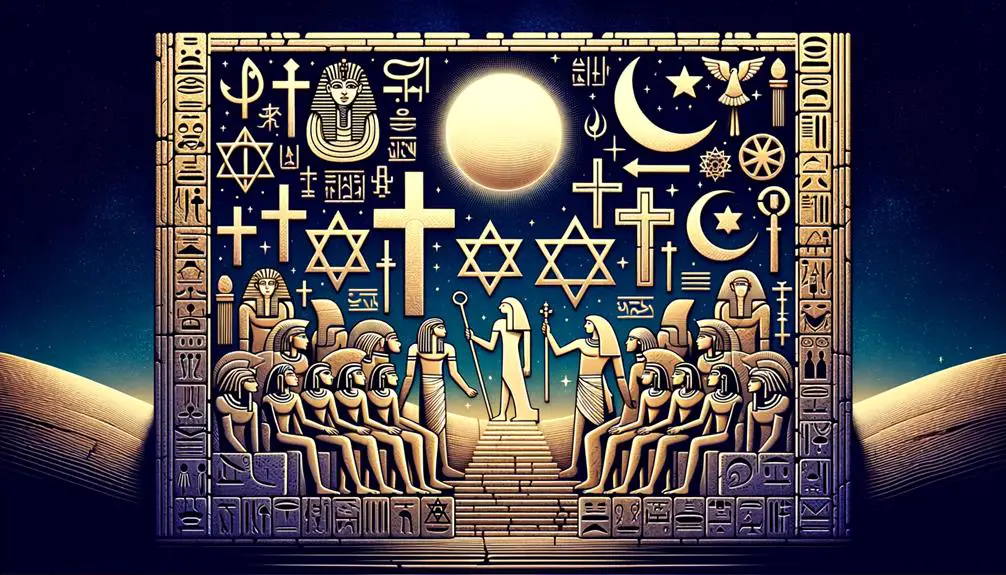
Exploring Ramses' monumental legacy prompts a reevaluation of how modern faith communities interpret ancient texts and artifacts. This exploration isn't just an academic pursuit; it deeply affects contemporary interpretations and faith practices, challenging you to consider the historical context of religious narratives.
Aspect |
Impact on Modern Faith |
|---|---|
Historical Context |
Encourages a deeper understanding of scriptural stories. |
Archaeological Finds |
Provides tangible connections to biblical narratives. |
Linguistic Analysis |
Enhances the accuracy of translations and interpretations. |
Cultural Relativism |
Promotes respect for the beliefs and practices of ancient peoples. |
Theological Reflection |
Invites thoughtful consideration of divine interaction in history. |
This table succinctly encapsulates the multifaceted ways in which Ramses' story interacts with and informs modern faith practices. For instance, archaeological finds not only authenticate certain biblical accounts but also offer insights into the everyday lives of ancient civilizations, enriching your understanding of the scriptures. Similarly, linguistic analysis can uncover nuances in ancient texts, leading to more nuanced contemporary interpretations.
Moreover, engaging with Ramses' legacy through a scholarly lens doesn't diminish the spiritual value of biblical stories; rather, it deepens your appreciation for them by situating these narratives within their original cultural and historical contexts. This analytical approach encourages you to navigate your faith with both reverence and intellectual curiosity, fostering a richer, more informed spiritual life.
Frequently Asked Questions
How Has the Portrayal of Ramses in Popular Culture, Such as Films and Novels, Influenced Public Perception of His Biblical Role?
The portrayal of Ramses in films and novels has significantly shaped public perception, often prioritizing dramatic effect over historical accuracy. Movie accuracy frequently takes a backseat to compelling storytelling and striking costume design, leading to a skewed view of his role.
This creative liberty, while enhancing entertainment value, can distort understanding of historical figures, blending fact with fiction. As a result, your perception of Ramses may be more influenced by Hollywood than historical records.
Are There Any Major Theological Discussions or Controversies Within Different Religious Communities Regarding Ramses' Actions and Decisions as Depicted in the Bible?
You're diving into whether Ramses' actions and decisions, particularly his economic policies and religious reforms, spark major theological discussions or controversies among different faith communities.
It's crucial to note these debates often revolve around how his governance impacted the spiritual and societal landscape, not just in historical terms but also in how they're interpreted within sacred texts.
This analysis requires a thorough understanding of both the ancient context and contemporary religious perspectives.
How Do Modern Technological Advancements, Like DNA Analysis or Satellite Imaging, Offer New Insights or Challenge Existing Beliefs About Ramses' Reign and Its Biblical Connections?
Imagine archaeologists using satellite images to unearth a previously hidden palace of a Pharaoh. This discovery, coupled with genetic markers found in mummies, can revolutionize your understanding of ancient reigns.
These modern tools, such as DNA analysis and satellite imaging, challenge traditional narratives by providing concrete evidence. They uncover satellite artifacts and genetic data that either corroborate or dispute long-held beliefs about historical figures and their impacts on civilizations.
In What Ways Have Interpretations of Ramses' Character in the Bible Evolved Over Centuries Due to Changes in Historical Scholarship, Archaeology, and Literary Analysis?
You've seen how interpretations of this character have shifted due to evolving historical scholarship, archaeology, and literary analysis. Textual discrepancies and chronological debates have fueled these changes. This evolution reflects the dynamic nature of historical inquiry, where new findings and methodologies can significantly alter our understanding.
As you delve deeper, you'll appreciate the complexity of piecing together history from ancient texts and artifacts, illustrating the fluidity of historical narratives.
Can Parallels Be Drawn Between Ramses' Leadership Style and Contemporary Political Figures in Terms of Governance, Warfare, and Dealing With Dissent or Rebellion?
You're navigating uncharted waters when comparing Ramses' leadership to today's politicians. Yet, it's plausible. His knack for economic reforms and cultural diplomacy mirrors contemporary leaders facing similar challenges. Ramses' approach to governance, warfare, and quelling dissent has echoes in today's political landscape.
Analyzing these parallels, you'll find a blend of ancient strategies and modern tactics, offering insights into how enduring these leadership qualities truly are.
Conclusion
In the vast tapestry of history, Ramses stands as a colossal figure, woven into the fabric of both Egyptology and biblical narratives. As scholars untangle the threads of evidence, debates around his identity in the Exodus story continue to spark.
Yet, his legacy, cemented in the sands of time, offers a bridge between ancient texts and modern faith. In exploring Ramses, we navigate a labyrinth of history and belief, highlighting the enduring quest for understanding that defines the human spirit.



Sign up